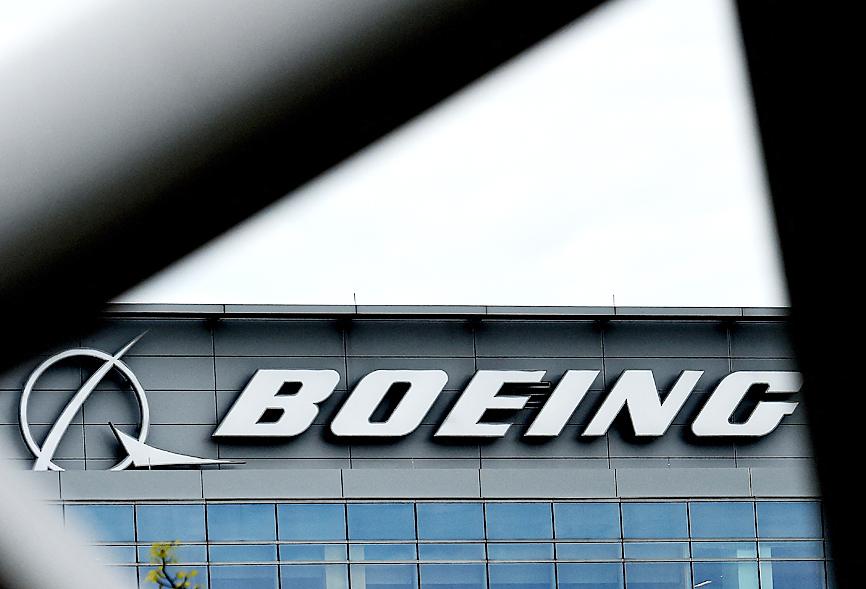Boeing Co has halted titanium purchases from Russia while Airbus SE continues to source from the country, highlighting the uncertain path for aerospace manufacturers following the invasion of Ukraine.
Boeing said it does not anticipate a major disruption to aircraft output in the near term after an initiative in recent years to diversify its metal sourcing arrangements.
The decision to stop purchases comes after the US planemaker last week said that it would suspend major operations in Moscow.

Photo: AFP
“Our inventory and diversity of titanium sources provide sufficient supply for airplane production and we will continue to take the right steps to ensure long-term continuity,” Boeing said on Monday in an e-mailed statement.
Aerospace companies have been bracing for the fallout on titanium supplies from Russia’s attack on Ukraine, in part due to financial sanctions that make payments to Russian firms difficult.
Russia’s VSMPO-Avisma Corp supplies nearly one-quarter of global titanium.
Boeing announced a new deal with the company in November last year.
Boeing, which has been stockpiling the metal in the past few months, gets about one-third of its titanium from Russia, the Wall Street Journal reported earlier.
Boeing chief executive officer Dave Calhoun said during the company’s January earnings call that the company is “protected for quite a while, but not forever.”
Airbus, which has also suspended operations in Moscow, and stopped providing parts and maintenance to Russian customers, said it is sourcing titanium from Russia and other countries.
The purchases are made in accordance with all sanctions and applicable export control regulations, the European firm said via e-mail.
Besides Boeing, aerospace firms including Safran SA and Dassault Aviation SA are looking for alternative supplies of titanium, which is used in airplane parts from engines to fasteners.
“It’s a big concern for us,” Dassault CEO Eric Trappier told reporters at an earnings conference last week, but without providing details on available inventories of the metal. “We are trying to find alternatives, which exist, to cope with this new situation.”

Merida Industry Co (美利達) has seen signs of recovery in the US and European markets this year, as customers are gradually depleting their inventories, the bicycle maker told shareholders yesterday. Given robust growth in new orders at its Taiwanese factory, coupled with its subsidiaries’ improving performance, Merida said it remains confident about the bicycle market’s prospects and expects steady growth in its core business this year. CAUTION ON CHINA However, the company must handle the Chinese market with great caution, as sales of road bikes there have declined significantly, affecting its revenue and profitability, Merida said in a statement, adding that it would

i Gasoline and diesel prices at fuel stations are this week to rise NT$0.1 per liter, as tensions in the Middle East pushed crude oil prices higher last week, CPC Corp, Taiwan (台灣中油) and Formosa Petrochemical Corp (台塑石化) said yesterday. International crude oil prices last week rose for the third consecutive week due to an escalating conflict between Israel and Iran, as the market is concerned that the situation in the Middle East might affect crude oil supply, CPC and Formosa said in separate statements. Front-month Brent crude oil futures — the international oil benchmark — rose 3.75 percent to settle at US$77.01

RISING: Strong exports, and life insurance companies’ efforts to manage currency risks indicates the NT dollar would eventually pass the 29 level, an expert said The New Taiwan dollar yesterday rallied to its strongest in three years amid inflows to the nation’s stock market and broad-based weakness in the US dollar. Exporter sales of the US currency and a repatriation of funds from local asset managers also played a role, said two traders, who asked not to be identified as they were not authorized to speak publicly. State-owned banks were seen buying the greenback yesterday, but only at a moderate scale, the traders said. The local currency gained 0.77 percent, outperforming almost all of its Asian peers, to close at NT$29.165 per US dollar in Taipei trading yesterday. The

RECORD LOW: Global firms’ increased inventories, tariff disputes not yet impacting Taiwan and new graduates not yet entering the market contributed to the decrease Taiwan’s unemployment rate last month dropped to 3.3 percent, the lowest for the month in 25 years, as strong exports and resilient domestic demand boosted hiring across various sectors, the Directorate-General of Budget, Accounting and Statistics (DGBAS) said yesterday. After seasonal adjustments, the jobless rate eased to 3.34 percent, the best performance in 24 years, suggesting a stable labor market, although a mild increase is expected with the graduation season from this month through August, the statistics agency said. “Potential shocks from tariff disputes between the US and China have yet to affect Taiwan’s job market,” Census Department Deputy Director Tan Wen-ling